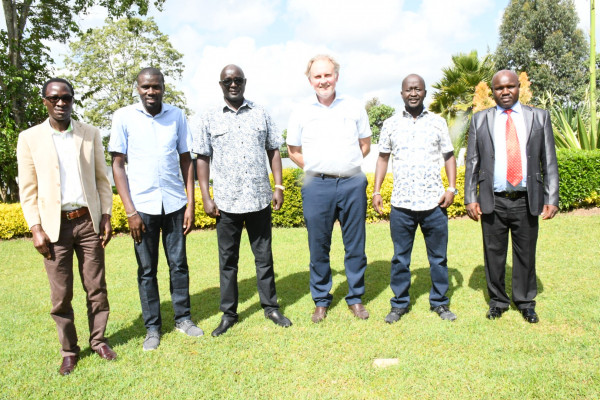Governor Simon Kachapin and Deputy Robert Komolle give a brief on the progress of Africa Borderlands Center/ UNDP Rapid Recovery to Covid-19 and climate-induced shocks programme along the Pokot-Uganda border
Governor Simon Kachapin flanked by deputy Robert Komolle had this morning been debriefed on the progress of Africa Borderlands Center/ UNDP Rapid Recovery to Covid-19 and climate-induced shocks programme along the Pokot-Uganda border.
The borderlands programme being implemented in collaboration with NDMA, aims to provide alternative livelihoods to border communities, especially in the wake of the Covid-19 pandemic. The programme was initiated for communities along the Karamoja cluster following the signing of an agreement between UNPD and The government of Sweden in October 2021.

The programme funded by The Swedish government seeks to end hostilities among the three neighbouring communities namely; Pokot, Turkana and Karamoja. In addition, it aims to improve the wellbeing of communities by averting conflicts and improving their socio-economic status.
Governor Kachapin hailed the programme saying it directly supports the border communities where conflicts results from scarcity of resources. He said there was still need to train border communities on alternative livelihoods and border peace.

“What you are doing along the border is bearing fruits and we will continue to collaborate on such interventions,” pointed out the governor.
He said through the established government structures, the county will coordinate with other counties and neighboring Uganda to ensure that cross-border initiatives are successful.
Nicklas Svensson, STHLM Policy Group and Duncan Chando, Project Officer-Transcending Peace, UNDP said the project had changed livelihoods and brought a sense of stability along the border area.

“A lot of coordination is at the core of what we are doing and we must work together to achieve lasting peace along the border,” said Mr. Chando.
Deputy Komolle noted that education of the border communities was also key towards resolving border disputes. He also highlighted the need to improve livestock breeds and engage in other activities to diversify livelihoods.

CEC PSM and ICT said the county was on course to develop a Peace Policy which will guide peace efforts in collaboration with partners.

Through the cross-border program, Nasal Water Project was constructed and 25 groups from West Pokot were supported with diverse range of investments from posho mills, bulls, galla goats, water pumps and beehives.

